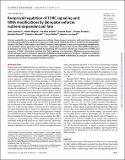Reciprocal regulation of TORC signaling and tRNA modifications by Elongator enforces nutrient-dependent cell fate
Author(s)
Russell, Brandon S; Dedon, Peter C
DownloadPublished version (18.44Mb)
Publisher with Creative Commons License
Publisher with Creative Commons License
Creative Commons Attribution
Terms of use
Metadata
Show full item recordAbstract
Nutrient availability has a profound impact on cell fate. Upon nitrogen starvation, wild-type fission yeast cells uncouple cell growth from cell division to generate small, round-shaped cells that are competent for sexual differentiation. The TORC1 (TOR complex 1) and TORC2 complexes exert opposite controls on cell growth and cell differentiation, but little is known about how their activity is coordinated. We show that transfer RNA (tRNA) modifications by Elongator are critical for this regulation by promoting the translation of both key components of TORC2 and repressors of TORC1. We further identified the TORC2 pathway as an activator of Elongator by down-regulating a Gsk3 (glycogen synthase kinase 3)–dependent inhibitory phosphorylation of Elongator. Therefore, a feedback control is operating between TOR complex (TORC) signaling and tRNA modification by Elongator to enforce the advancement of mitosis that precedes cell differentiation.
Date issued
2019-06Department
Massachusetts Institute of Technology. Department of Biological EngineeringJournal
Science advances
Publisher
American Association for the Advancement of Science (AAAS)
Citation
Candiracci, Julie et al. "Reciprocal regulation of TORC signaling and tRNA modifications by Elongator enforces nutrient-dependent cell fate." Science advances 5(2019): eaav0184 © 2019 The Author(s)
Version: Final published version
ISSN
2375-2548